| Construction Rating: | starstarstarstarstar_border |
| Flight Rating: | starstarstarstarstar_border |
| Overall Rating: | starstarstarstarstar |
| Published: | 2010-01-04 |
| Manufacturer: | Binder Design  |
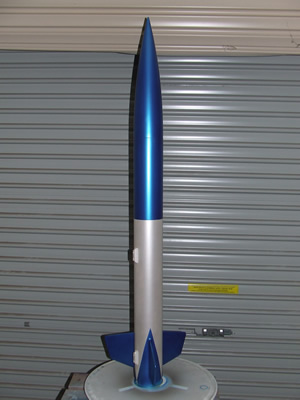
Brief:
A 3FNC single-stage rocket with an 11" payload section, a 38mm motor mount, and a 30-inch parachute.
Modifications:
Construction:
This kit comes with two body tubes (23", 11"), 38mm motor mount tube, tube coupler, aircraft plywood bulkhead, pre-cut aircraft plywood fins, two centering rings (mine came with the older style masonite rings, however the newer kits come with aircraft plywood), nosecone, 1/2" launch lug, 30" Parachute, a long length of tubular nylon and eye-bolts. To top it off, the kit comes with a nice pre-cut vinyl sticker.
The instructions were very easy to follow, and unlike other manufacturers is supplied as a multipage document with detailed drawing to assist with following the instructions. Some sections assume prior knowledge such as where to position the parachute on the recovery harness, however most rocketeers that have reached this point in rocketry will already have the skills required to fill in these gaps.
I added a simple third centering ring to the aft end as I opted to use a PML branded HAMR for positive motor retention as I am a firm disbeliever in friction fitting motors. I also opted away from the 1/2" launch lug since the club I launch at skips from 1/4" to rails so I opted for PML small linear launch lugs.
The most difficult part was cutting the fin slots, however what made this easier were the pre-marked lines for the fins and launch lug. Fin alignment on this kit was made a simple task with the included fin alignment guide!
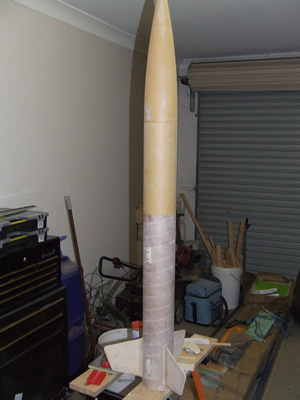
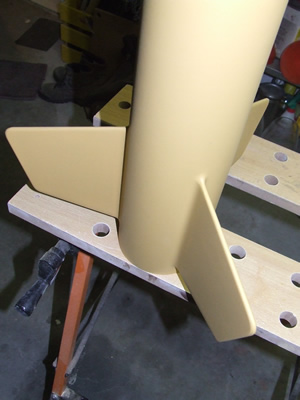
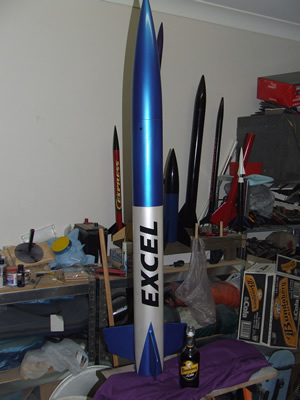 Finishing:
Finishing:
The spirals in the tube needed to be filled independently as they were a little deep (I have seen worse). The nosecone also has some imperfections that took a bit of effort to smooth out. I used West Systems epoxy with 403 Microfibre blend for the fin fillets, then sprayed the finished rocket with Autoair Pearlescent White for the aft section and Pearlescent Blue for the forward section. The decal was supplied as a vinyl sticker and was a simple task to apply. The final look of the rocket was awesome!
Construction Rating: 4 out of 5
Flight:
Flight preparation was easy, especially as a Cert 1 Flight. The main issue I have found is that I have to modify the delay on almost all Aerotech motors in the H range as it often requires exactly between the medium and short delays. Unfortunately at this stage in Australia, Aerotech is the main type of APCP motor available.
I opted for a Top Flight 12" Nomex® heat shield rather than using some form of wadding, and although I used a PML HAMR for retention I had to use friction fit for my first flight due to a mix-up in ordering the HAMR 38-29 adapter.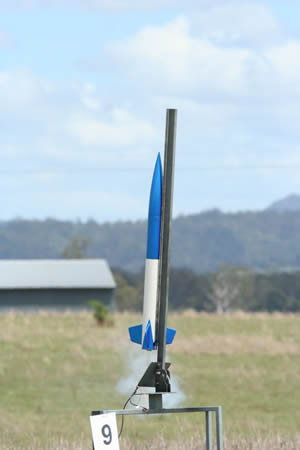
On the H128 I shortened it down to an 8 second delay, however it probably could have done with being shortened down to 7 seconds as it was a little "nose-down" when ejection occurred.
Recovery:
The standard configuration for the shock-cord it tied directly to the eyebolt attached to the forward centering ring, and then tied to the eyebolt on the bulkhead at the base of the payload bay. I decided to get a set of quick links in case I decided to change anything, and rather than tying it off I sowed loops into each end.
Because I chose the Nomex heat shield there was no damage to the chute or recovery harness.
Flight Rating: 4 out of 5
Summary:
Overall I am very happy with the kit, it was simple to assemble, simple to fly, and IMHO looks awesome! The only drawback I have found is that it is a little heavy, and therefore requires the shortened delays for the smaller motors.
The next thing I intend to do is to replace the payload bay with an altimeter bay and extension tube to make it a bit taller.
Overall Rating: 5 out of 5
Other Reviews
- Binder Design Excel By Jonathan Carter
Built with 54mm mount and 38mm adapter. 24" payload tube and Binder Avionics bay added and used for dual deployment. Stock 10" payload tube with bulkheads added to provide method of adding forward weight. Modifications: This rocket was used for my level 1 Cert flight and will be used without modification for my level 2 cert flight. It flew perfectly on a Loki Research I405 to 1633 ft. It ...
 |
 |
Flights
Sponsored Ads
 |
 |











